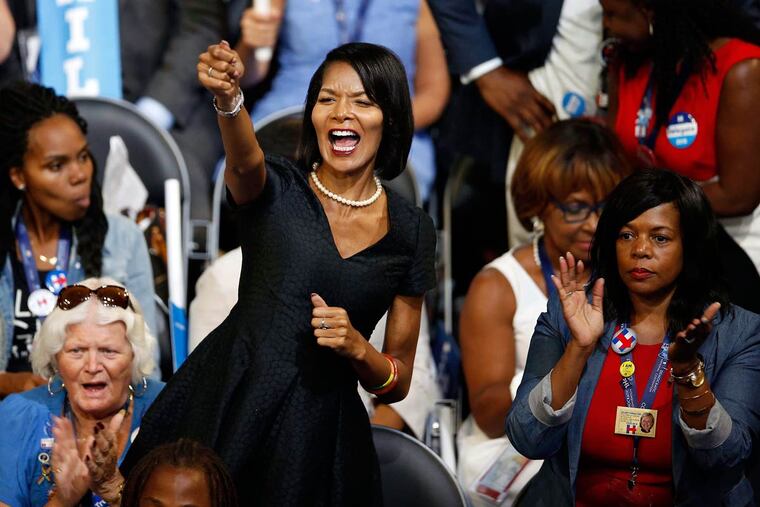For working women, Clinton's success brings hope, with 'so much to be done'
Decades ago, Peggy McCausland worked as a secretary in an office that felt a lot like the TV show Mad Men.

"It was just rampant sexual harassment," she said. "So you just tolerated it because you had no choice."
Workplace culture has changed, said McCausland, now a lawyer and member of the Forum of Executive Women, a group of Philadelphia-area business leaders.
But in many offices, she said, women still face sexual harassment and earn less than male colleagues.
The numbers aren't in dispute: Women who worked full time in 2014 earned, on average, 79 percent of what men earned, according to a U.S. Department of Labor analysis. That gap remains despite women surpassing men in earning college degrees, the analysis found.
The issues aren't new, but with Hillary Clinton's bid for the White House, they may now have their most prominent advocate and platform.
Clinton has been a working woman for decades, and she and the Democratic Party have signaled that trait will be a cornerstone of her bid to win voters.
The message was on display at the Democratic Convention Thursday night, in the run-up to Clinton's acceptance speech.
Among the speakers telling their stories from the stage at the Wells Fargo Center were a Kansas teen who lost her job at a pizza shop after she asked her boss why she was paid 25 cents less than a male coworker; an Ohio mom who works two jobs; and a homecare worker helping Clinton argue for a higher minimum wage.
On the campaign trail, Clinton often says she will work to close the gender pay gap, push to raise the minimum wage, and fight for paid family leave.
In her acceptance speech, Clinton noted her historic nomination, and the opportunity to help millions of American women. "When there are no ceilings, the sky's the limit," she said.
Some see it as a reason for hope.
"Hillary and a lot of other women leaders - like Melinda Gates - all of them are very important in the fact that they are real examples that we can hold up," said Michelle Legaspi Sanchez, director of programs for the Chester County Fund for Women and Girls. But, she said, "there's still so much to be done ... Even though glass ceilings are being broken, it's not enough."
Ellen Brotman, a defense lawyer for Philadelphia-based firm Griesing Law LLC, said issues such as the gender gap in pay and balancing work and raising children must be addressed.
But women also care about other issues, she said.
"We don't want to get pigeon-holed into discussing women's issues," Brotman said. "Because the biggest women's issue for us is really the economy. We need a vibrant economy that includes well-paying jobs for everyone, including women."
Brotman recalled a recent conversation with two young women doctors who told her they avoid talking about their children at work because they don't want it to interfere with their careers.
"And if they have a family obligation that creates a need for them to be away from work, if they can avoid it they don't frame it as a family obligation," she said.
Valerie Arkoosh, a physician, Montgomery County commissioner and a Democratic Party delegate for Clinton, said raising the minimum wage would not only help women, but could reduce poverty. Women with children sometimes outnumber men in homeless shelters in Montgomery County, she said.
Arkoosh was one of few women leading a department when she chaired Drexel University's anesthesiology department in the late 1990s.
Her son, then 3, had an appropriately narrow, if not heartening view of the world, she said. He knew only two doctors - his mother and his pediatrician. Both were women.
"One my friends asked him one day if he wanted to be a doctor when he grew up and he just looked up and said, 'Well, I cant be a doctor, only women are doctors,'" Arkoosh said. "That has just always stuck with me about the importance of role models."